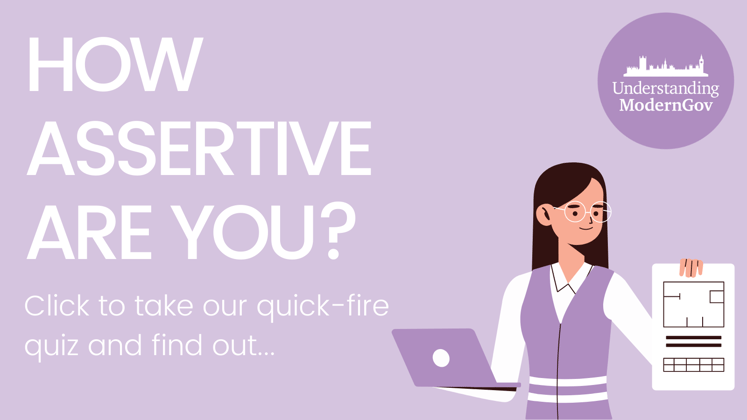Abrasive or Assertive: What’s the Difference?
 Chloe Martin
·
3 minute read
Chloe Martin
·
3 minute read
Have you ever been branded as abrasive or bossy after standing up for yourself or asking for something you want?
This can happen a lot.
Especially if you use abrasive instead of assertive conversation traits.
More on those below.
Assertive Vs. Abrasive Meaning
Assertiveness is not universally understood to be a positive trait (especially when we are talking about women in leadership), but it is easily confused with abrasiveness.
Assertiveness is the quality of being self-assured and confident without being aggressive. Whereas, abrasiveness qualities tend to be overly aggressive and will often cause ill will or annoyance to those around them.
When used in the right way, assertiveness can be the key to working in or managing a high-performing and effective team, but abrasiveness can have the opposite impact.
What Does it Mean to be an Abrasive Person?
Worried you may portray abrasive characteristics? Or trying to work out if someone is being abrasive towards you? Here are five specific personality characteristics of an abrasive person:
-
Quick to criticise
-
Makes jokes at another's expense
-
Has no filter in conversations
-
Enjoys creating awkward or uncomfortable situations for others
-
Often hands out advice no one asked for
Does Abrasive Mean 'Rude'?
Cambridge Dictionary has defined abrasive as 'rude and unfriendly' so it's very likely that being abrasive to anyone will have a positive outcome.
How to Respond to an Abrasive Person
When someone is being abrasive towards you it can be difficult to know how to react or respond. If you're experiencing abrasiveness from a specific person at work, take them to one side for a one-to-one meeting and have a direct conversation. Abrasive people get a thrill from conflict or negative responses to their behaviour, especially in front of a group.
Abrasive people can also come across as overly opinionated and outspoken in the workplace. They will often make others uncomfortable because of this and struggle to have a two-sided conversation. You're bound to hear all their opinions!
What is an Assertive Person?
Being assertive is all about having the ability to relate to others sincerely, communicate with clarity and understand one's own strengths (personally or in the workplace). Five specific characteristics of an assertive person:
-
Confident in themselves and their opinion
-
Respective of other opinions
-
Good listener
-
Have self-control
-
Can express their thoughts clearly without speaking over others
Want to Become More Assertive? Here are Three Quick Things to Think About
1. Being shy is not a permanent condition
.
A myth that we often hear is; you are born either shy or assertive. Assertiveness can be learned.
So, what’s a shy person to do in a world where leaders are expected to be assertive and ask for what they want? Don’t do anything drastic. There are ways of being assertive and gaining a win-win outcome for everyone, without having to shout the loudest. Every personality type can achieve professional and personal success with the right skills.
Know when to challenge yourself so that shyness doesn’t hold you back.
Assertiveness is a skill that can be developed and refined. By learning core practical skills including using your body language and improving your communication techniques you can get your point across with ease.
Passive-aggressive communication is another trait that can get confused with assertiveness and abrasiveness. Read our blog post on 4 ways to turn a passive-aggressive communication style into an assertive one to understand where your communication style fits.
2. Read the situation
Before you make changes to your behaviour, know the context you are working in or dealing with at the time. Does the culture value forcefulness? Or do you work in a situation where a persuasive, quieter approach is more appropriate?
Understand the context, assess your behaviour, and then make appropriate adjustments.
It’s vital to use assertiveness to navigate challenging situations with ease and professionalism, but how can you do that if you don't know how assertive you actually are?
Well, now you can find out by using our quick-fire assertiveness quiz that will tell you how assertive you are in just one minute, along with detailed feedback and an action plan. What are you waiting for?
3. Learn to be assertive
Effective assertiveness can help you influence your peers and external stakeholders in an insistent and self-assured way.
The ability to make a lasting impression on staff, colleagues and key stakeholders is an invaluable asset in a public sector environment.
Discover 4 proven ways to become effectively assertive in the workplace.
Enhance your levels of assertiveness to help you become a more decisive and influential manager. To get started, see our upcoming course below.
Learn Assertiveness Best Practices with our Course
Being effectively assertive is all about having healthy confidence to stand up for your beliefs and not being defensive. Discover how to make a positive impact at work with assertiveness through interactive exercises and expert-led feedback. Secure your spot on our confident assertiveness in the workplace course.
2+ years in SEO and content marketing. Striving to help public sector professionals develop their skills and learn something new through high-quality content.


.jpg?width=640&name=pexels-tiger-lily-7109173%20(1).jpg)





-Feb-07-2024-11-52-51-0705-AM.jpg)
